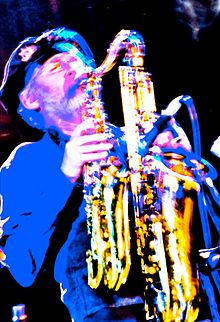
Guy Randolph Evans is an English drummer and a member of the progressive rock band Van der Graaf Generator.
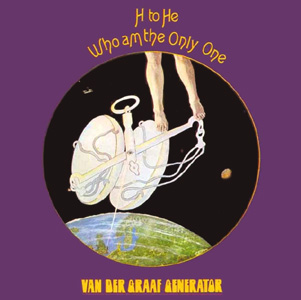
H to He, Who Am the Only One is the third album by the British progressive rock band Van der Graaf Generator. It was released in 1970 on Charisma Records.
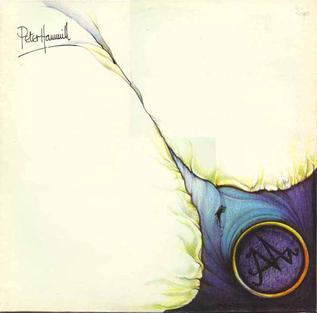
The Silent Corner and the Empty Stage is the third album by British singer-songwriter Peter Hammill. It was released on Charisma Records in 1974, during a hiatus in the activities of Hammill's progressive rock band Van der Graaf Generator. Other ex-members of Van der Graaf Generator also perform on the recording.
21st Century Schizoid Band were a King Crimson alumnus group formed in 2002.

The Least We Can Do Is Wave to Each Other is the second album by the British progressive rock band Van der Graaf Generator, released in February 1970 on Charisma Records. It was the group's first album to be released in the UK and the only one to chart in the top 50 in that country.

Michael "Jakko" Jakszyk is an English musician, record producer, and actor. He has released several solo albums as a singer, songwriter, and multi-instrumentalist and has been the lead singer for King Crimson since 2013. His work has been variously credited to "Jakko", "Jakko Jakszyk", and "Jakko M. Jakszyk".
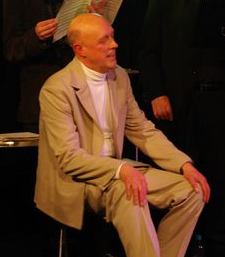
Christopher John Judge Smith, is an English songwriter, author, composer and performer, and a founder member of progressive rock band Van der Graaf Generator. Initially working under the name Chris Judge Smith, he has been known simply as Judge Smith since 1994. After Van der Graaf Generator, he has written songs, stage musicals and operas, and from the early 1990s on he has released a number of solo CDs, including three "Songstories".

The Quiet Zone/The Pleasure Dome is the eighth album by British progressive rock band Van der Graaf Generator. Released in 1977, it was their last studio album before their 2005 reunion. The album features a more energetic, new wave sound than its three immediate predecessors, anticipating singer and songwriter Peter Hammill's late 1970s solo work.

Vital: Van der Graaf Live is the first live album by English progressive rock band Van der Graaf Generator. It was recorded 16 January 1978 at the Marquee Club in London and was released in July, one month after the band's 1978 break-up. The album was credited under the abbreviated name Van der Graaf, like the previous year's The Quiet Zone/The Pleasure Dome (1977), and featured the same line-up plus newcomer cellist/keyboardist Charles Dickie, who had officially joined the band in August 1977, and original saxophonist and flautist David Jackson, who re-joined the band for this recording.

Hugh Robert Banton is a British musician and electronic organ builder, most widely known for playing organ and keyboards with the group Van der Graaf Generator.

The Aerosol Grey Machine is the debut studio album by English progressive rock band Van der Graaf Generator. It was first released in the United States in 1969 by Mercury Records.
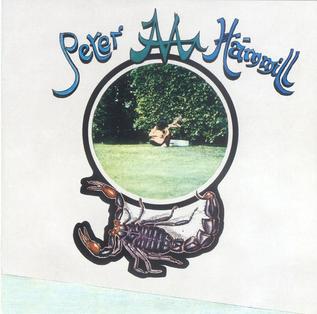
Chameleon in the Shadow of the Night is the second solo album by British singer-songwriter Peter Hammill. It followed in the aftermath of the breakup of Hammill's band Van der Graaf Generator, and other ex-members of Van der Graaf Generator perform on the album.
The Tangent is a progressive rock group formed in 2002.

Van der Graaf Generator are an English progressive rock band, formed in 1967 in Manchester by singer-songwriters Peter Hammill and Chris Judge Smith and the first act signed by Charisma Records. They did not experience much commercial success in the UK, but became popular in Italy during the 1970s. In 2005 the band reformed, and are still musically active with a line-up of Hammill, organist Hugh Banton and drummer Guy Evans.

Real Time: Royal Festival Hall, London, 06.05.05 is a live album by Van der Graaf Generator, released in 2007 on Fie! Records. It contains the entire recording of the group's reunion concert at the Royal Festival Hall in London, England on 6 May 2005. The album includes at least one song from every album released between 1970-1976, plus their 2005 reunion album Present. Nothing is included from 1969's Aerosol Grey Machine and The Quiet Zone/The Pleasure Dome, released in 1977 after Hugh Banton and David Jackson left the group. The album also contains "(In the) Black Room", a song performed live by Van der Graaf Generator in 1972 ; following the band's August 1972 breakup, it was released on Peter Hammill's 1973 solo album Chameleon in the Shadow of the Night, with Banton, Evans and Jackson all performing on the track.

Trisector is the tenth studio album by the British rock group Van der Graaf Generator. It was released on Virgin/EMI Records in March 2008. It is an important release for Van der Graaf Generator because it is the first album the band recorded as a trio. Saxophonist David Jackson departed the band following the 2005 tour.

Nic Potter was a British bassist, composer and painter, best known for his work with the group Van der Graaf Generator in the 1970s.
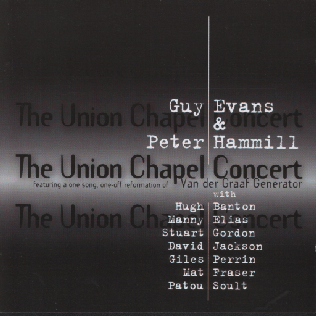
The Union Chapel Concert is a live album by Guy Evans and Peter Hammill, recorded in the Union Chapel in London, 3 November 1996, and released as a double CD in March 1997. The album is noteworthy because it is the first time the four ex-members of Van der Graaf Generator, Hammill, Evans, Hugh Banton and David Jackson, played together in front of a paying audience since the band had broken up in 1978. The subtitle on the front of the album reads: "featuring a one song, one-off reformation of Van der Graaf Generator." David Jackson and Hugh Banton were unannounced guests and played a Soundbeam-medley and a Samuel Barber Adagio for strings on the church organ respectively. All songs that evening were played in varying line-ups. Only "Lemmings" was played by Hammill, Evans, Banton and Jackson.

Time Vaults is an album by Van der Graaf Generator. It was originally released in 1982 on cassette only, almost four years after the break-up of Van der Graaf Generator in 1978. Later it was released as a vinyl LP, and in 1992 it was released on CD.
"A Plague of Lighthouse Keepers" is a song by the English rock band Van der Graaf Generator, from their fourth album Pawn Hearts (1971). It is a concept piece over 23 minutes long, which comprises the whole B-side of the album. "A Plague of Lighthouse Keepers" evolved in the studio, recorded in small sections and pieced together during mixing. The song has many changes in time signature and key signature, and even incorporates some musique concrète.
